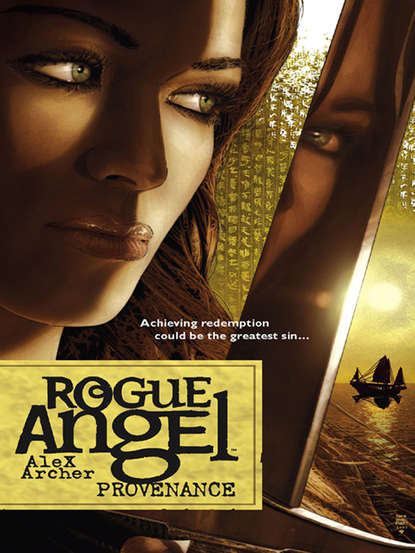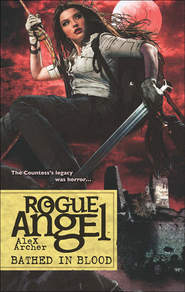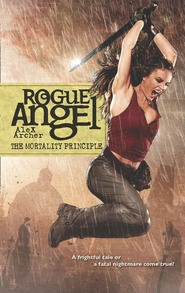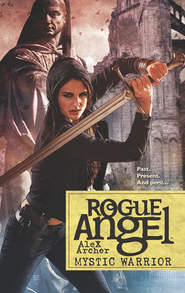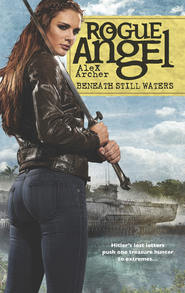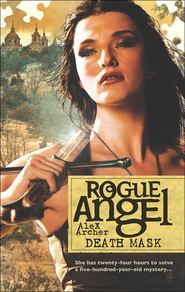По всем вопросам обращайтесь на: info@litportal.ru
(©) 2003-2025.
✖
Provenance
Автор
Год написания книги
2019
Настройки чтения
Размер шрифта
Высота строк
Поля
“HEY, CYRUS! My man,” sang out the deep-tanned man with the aloha shirt open to reveal a chestful of grizzled hair with a gaudy gold medallion in the midst of it. He had a New Jersey accent, a shiny brown bald front to his head and a big, hard paunch. His voice echoed over the slight sloshing of water inside the boathouse. “Do I deliver the goods, or do I deliver the goods?”
The man he had addressed as Cyrus allowed himself a thin smile. “I guess that remains to be seen, doesn’t it, Marty?”
Marty Mehlman had his whole team, a dozen men, gathered together in the boathouse. Windows set high in the wooden walls spilled an olive-oil colored afternoon light across the water, the plank gangway and the big oceangoing yacht moored to the dock with its mast unstepped and made fast to the deck. The water threw back the light in shifts and surges, playing across the features of the men. Cyrus knew them to be a selection of experienced North American and Central American, mostly Panamanian, hoodlums. They were all pros, all intrinsically small-time—competent, but not the hotshots they thought they were. They had been hired to pull a job. They had done so in workmanlike fashion.
Maybe. Cyrus had not gotten where he was by taking things for granted. He happened to be in Panama City, on the Pacific end of the canal.
Marty liked to play up. He made a show of lighting a cigar before answering. Then, puffing a wreath of bluish smoke around his sunburned bean of a face, he said, “What, Cyrus. Don’tcha trust me?”
“You know what they say,” Cyrus said in a cold voice. “Trust, but verify.”
Marty shrugged. Cyrus had him down as a man who didn’t care what you said to him as long as he got paid.
Mehlman circled an upraised finger over his head and whistled to his crew. They used a block-and-tackle arrangement trolleyed from rails along the ceiling of the boathouse to pull a crate from the yacht’s hold. It was a big crate, four feet by four feet by eight. Its proportions were suggestive in a morbid sort of way.
Cyrus stood watching as the crate swayed onto the wharf. He wore a white tropical-weight suit and a white straw Panama hat with a garish fuchsia and neon-green tropical-flower band. It was the only hint of color about him, except for the amber of his aviator-style sunglasses. His hair, cut close to his skull, was light blond. His skin was so pale as to make him seem an albino, which he was not.
He was remarkably thin. He was so thin he looked fragile and looked shorter than his actual height, which was only a couple of inches under six feet without the hat. He was so desiccated that his skin had a parchmentlike texture. The combination of gauntness, pallor and dryness gave him the appearance of being both sickly and elderly—even his thin-lipped mouth was wrinkled like an old man’s.
Although not young, Cyrus wasn’t elderly. As for his skinniness, he had been born with a sense of taste. He simply didn’t care for food, so he ate little. He believed that excessive intake of fluids was bad for one’s health, so he drank little as well.
He did very little, though, to dispel any impression he might be infirm. He frequently found it useful.
When the long yellow pinewood box thumped on the dock Marty turned and squared himself toward Cyrus. “There,” he said, fists on hips. “The goods.”
“Give me a break, Marty,” Cyrus said. “It’s a box.”
“Okay. Okay. Louie, bust the crate open.”
A big rough-looking American with a broken nose and a blond crew cut came up with a four-foot wrecking bar. “Tell him to be careful,” Cyrus said.
“Be careful,” Marty said, as if translating.
Louie pried the crate with splitting, squeaking sounds. He pulled the lid off and let it slam down onto the dock.
Cyrus winced. He walked up and peered down. Inside was a lot of strawlike plastic packing material. He brushed at it until he saw a hint of dull gray metal. He touched it. It was cool and smooth to his fingertips.
“Clear it away,” he said.
Marty scowled and waved at his men. A couple of dark, spare Panamanians stepped up and scooped handfuls of the packing material out and dropped it on the planks.
“Whoa,” Marty said. “It’s a coffin.”
One of the Panamanians made the sign of the cross.
“Okay,” Marty said, puffing like a steamship on his cigar. “Are these the goods, or are they the goods.”
“They’re the goods,” Cyrus said.
“All right.” Marty slammed his hands together and rubbed his palms.
His lieutenant, Pujols, had light-colored skin and dark blond hair tied in a ponytail. He wore a lightweight white jacket over a black and scarlet shirt. His expression was pinched, his manner nervous. He had been shifting his weight from foot to foot the whole time.
“Just pay us and let us get outta here, okay?” he said in a staccato Puerto Rican accent. His jacket hung open, revealing a big angular hog leg of a government-model Colt autopistol in a holster beneath his left armpit.
Cyrus smiled. “Sure,” he said. “Why not? But don’t you want a look inside?”
Pujols made an unhappy, impatient sound low in his throat. Marty frowned, looking puzzled more than annoyed. “What?”
“Sure,” Cyrus said. “Look inside. You’ve worked hard for your money. Now why not get a look at what all the fuss is about?”
Marty chuckled. “Sure. Since you put it that way, why not?”
His men tried the lid. It wasn’t secured in any way. Though extremely heavy it swung open on hinges that might have been lubricated yesterday, so smooth and soundless were they. A waft of cool air freighted with exotic spices rolled out. Marty and his crew crowded around to peer inside.
Their faces open like flowers of amazement unfolding. “Oh, my God,” Marty breathed.
“Say hi to him for me,” the man he had called Cyrus said.
At both ends of the boathouse, along the landward wall, doors burst open. Men in street clothes stepped inside. They held MP-5 machine pistols with built-in sound-suppressers to their shoulders. The guns fired with little popping barks, like seals who had lost their voices.
Most of the men fell right down, dead in an instant, killed by surgically precise two-shot bursts to the head. Pujols was fast. Marty was faster than he looked. Both men ducked around on the water side of the opened casket. Pujols drew his big .45.
With barely a ripple and no sound beyond the wavelets slogging endlessly against the yacht’s sleek flanks, two heads wearing black wet suits and rebreather masks broke water right behind them. Suppressed MP-5s rose with them. They coughed explosively.
Marty and his nervous lieutenant fell backward into the water.
Cyrus gazed impassively at the bodies slumped on the dock in spreading maroon pools, the corpses bobbing slowly in the water.
“Thanks, boys,” he said as the two frogmen clambered up onto the decks and peeled their masks off their heads. The men reloaded their weapons and closed the doors. “Now, if you wouldn’t mind giving me a hand getting this sucker closed and picked up on the loader? We’ve got a boat to get it aboard before it sails,” Cyrus said.
“Who’s taking delivery?” one of the men who had come in from outside asked, strolling up. He had slung his machine pistol muzzle down behind his right shoulder.
Cyrus laughed like a crow cawing. “You should know better than to ask that, Rushton,” he said. “Need to know, amigo. Need to know.”
8
The taxi rolling down the wide toll road called the Corredor Sur from Tocumen International Airport on the city’s eastern edge was white and red faded near pink by the scorching Panamanian sun. It was a Buick, about as old as Annja herself. Its air conditioner wheezed asthmatically and thumped alarmingly without appreciably thinning the humid heat. The cabbie ran it full-on anyway, despite having all the windows rolled down. Its noise and the early-afternoon traffic sounds of downtown Panama City did have the beneficial effect of mostly drowning out the cab’s CD player, which was chugging out terrible mid-nineties studio-gangsta rap at a volume that would’ve rattled the windows had they been up. Annja could feel the beats in her teeth.
They turned off the highway at a downtown exit. As with a lot of Latin American cities everything except the skyscraper-central middle of the business district interspersed shiny looming modern buildings with smaller, more inhabitable-looking older ones. In this case older meant mostly a particularly baroque variant of Spanish Colonial that Annja found especially charming.
Looking out the window at the awning-shaded shops and the crowds Annja was struck by a resemblance to New Orleans’ Latin Quarter. For all its well-publicized French heritage her hometown owed as much cultural debt to its long period of Spanish occupation as to France.
She did find herself wondering, Does archaeology ever happen anywhere it isn’t hot or humid? Although to be fair, she had to admit that she wasn’t exactly there to do archaeology. She had archaeological aims, though—to try to make sure an unknown artifact was properly conserved. So maybe that counted.
Her Romanian contact had used what Annja suspected was pirated NSA image-comparison software to sift through terabytes of raw overhead imaging. She had a feeling not all of it was supposed to be publicly available.
Her hotel, the Executive, stood in the midst of Panama City’s booming financial district. Annja had picked it because it got good reviews online, its rates were reasonable and also because, to her thoroughly irrational delight, it looked like nothing so much as a tower of giant white Lego. She tipped the driver, a dark taciturn man who had spoken English with a Punjabi accent, and wore a maroon turban.





